When the Nvidia GeForce RTX 5090 hit the market, it disappointed many with its modest generational improvements over the RTX 4090, especially given its steep price. On the other hand, the Nvidia GeForce RTX 5070 Ti, while not significantly faster than its predecessor, offers a more budget-friendly option, making it the most sensible choice among the Blackwell series GPUs for those not looking to splurge.
At a base price of $749, the GeForce RTX 5070 Ti stands out as an exceptional 4K graphics card, potentially overshadowing the pricier RTX 5080. However, transparency is key: the RTX 5070 Ti I reviewed is an aftermarket model from MSI, priced at a hefty $1,099, which is more than the RTX 5080's $999. If you can snag an RTX 5070 Ti at its base price of $749, it's likely the best graphics card for the majority, particularly for those eyeing 4K gaming.
Purchasing Guide
The Nvidia GeForce RTX 5070 Ti becomes available on February 20, 2025, with a starting price of $749. Be aware, though, that various versions of this GPU may carry a higher price tag. At $749, it's a great value, but as the price increases, its appeal diminishes, especially when compared to the RTX 5080.
Nvidia GeForce RTX 5070 Ti – Photos
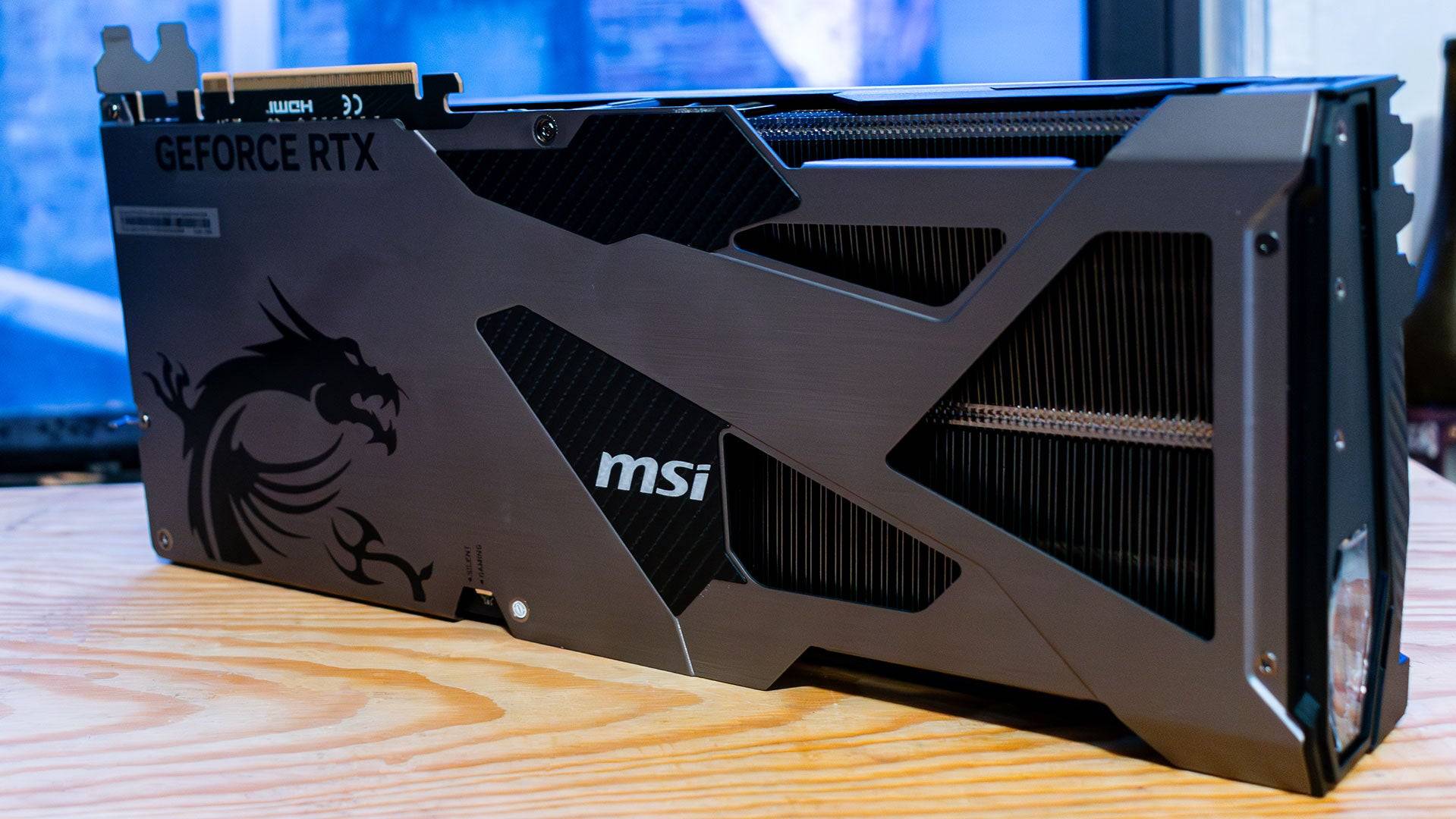
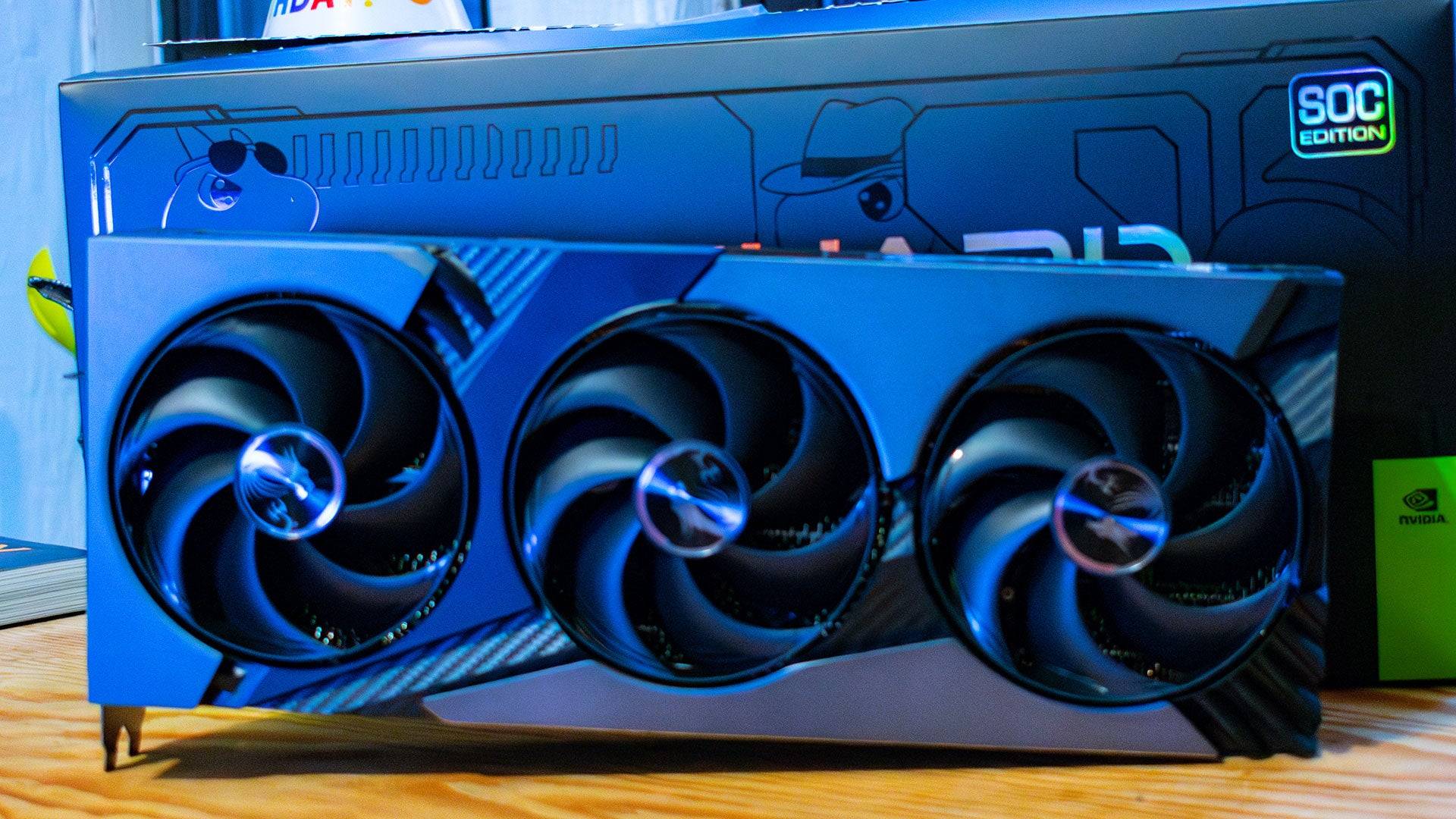 6 Images
6 Images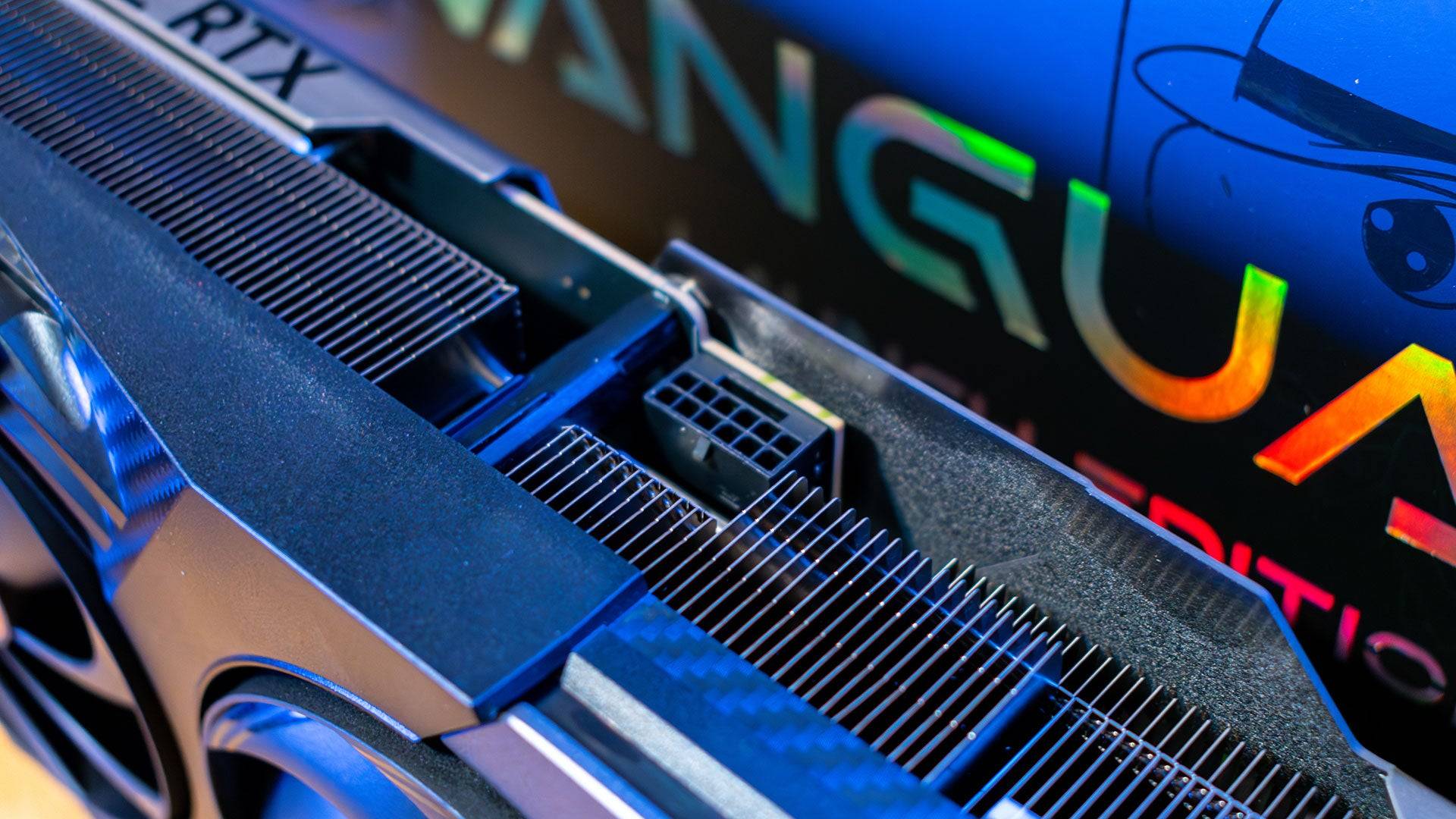
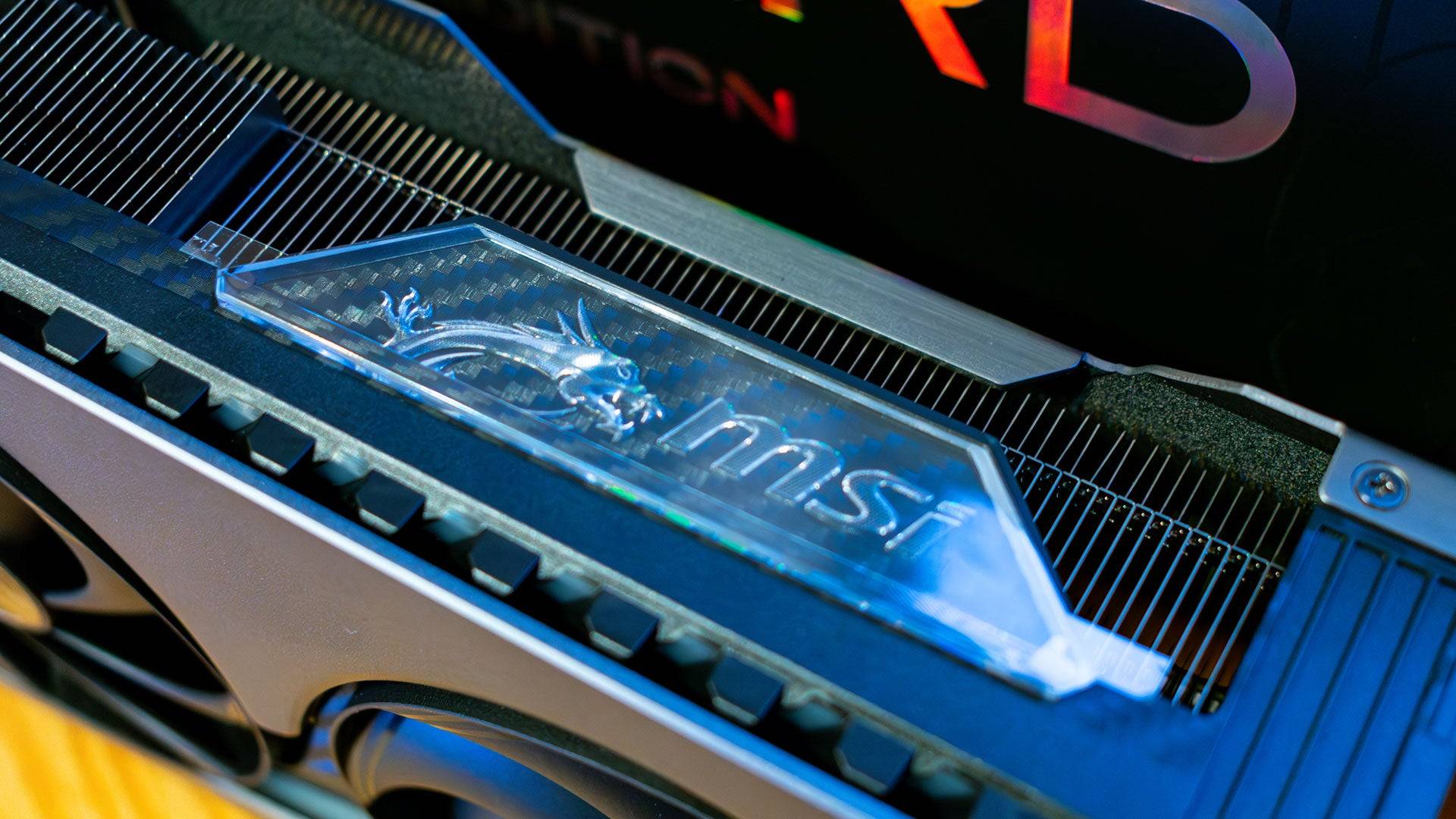
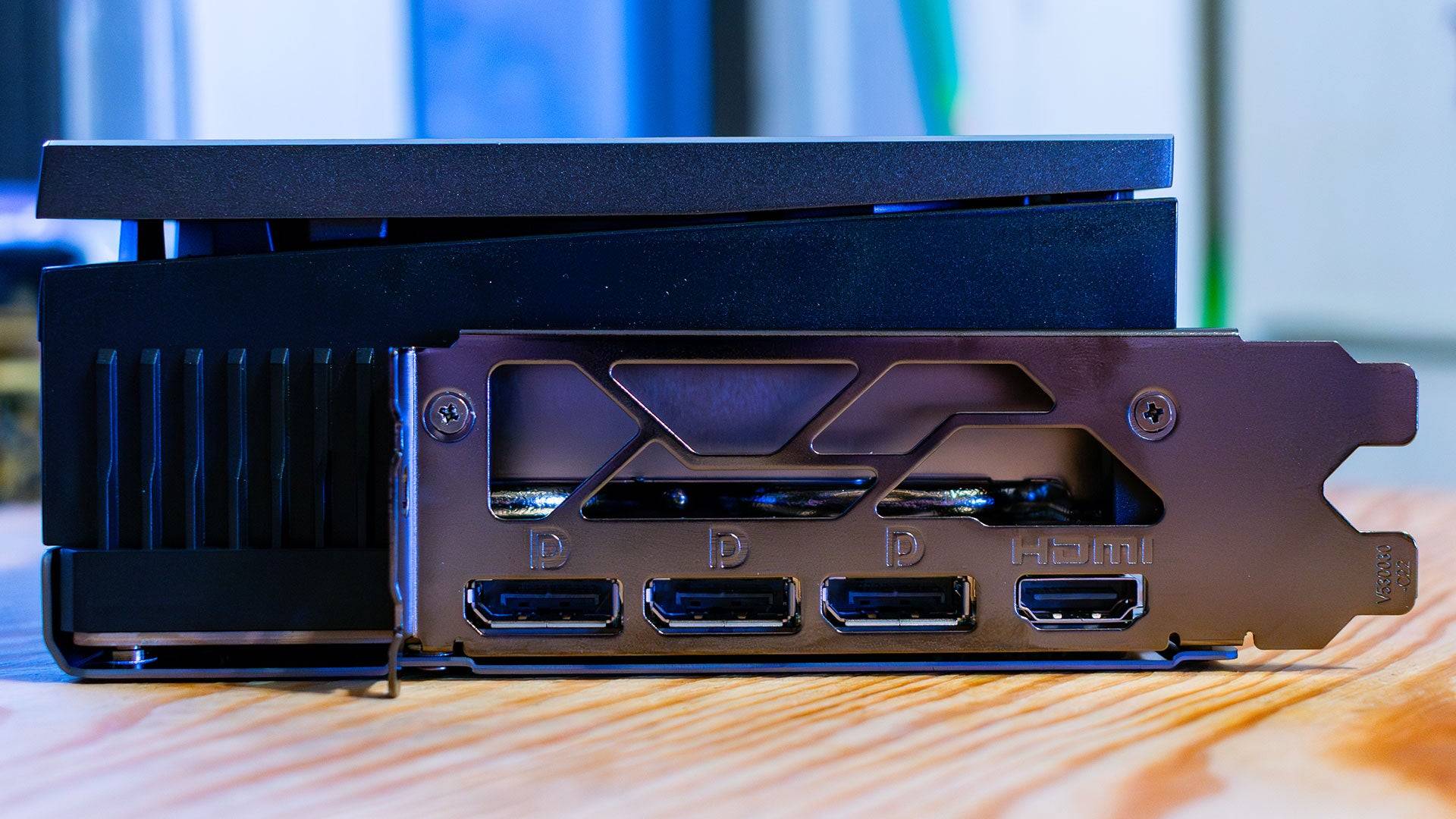

Specs and Features
The Nvidia GeForce RTX 5070 Ti marks the third GPU built on Nvidia's Blackwell architecture, originally designed for supercomputers powering AI models like ChatGPT. This architecture has been adapted for gaming GPUs while maintaining a strong focus on AI capabilities.
This card uses the same GB203 GPU as the RTX 5080, but with 14 of the 84 streaming multiprocessors (SM) disabled, resulting in 70 SMs, 8,960 CUDA cores, 70 RT cores, and 280 Tensor Cores. It also features 16GB of GDDR7 RAM, albeit slightly slower than the RTX 5080. The Tensor Cores are pivotal, as Nvidia relies on AI upscaling and frame generation to enhance performance significantly over the RTX 4070 Ti.
The Blackwell architecture introduces an AI Management Processor (AMP), shifting workload management from the CPU to the GPU, which enhances the efficiency of processes like DLSS and frame generation. This efficiency has led to a transformation in DLSS, now utilizing a Transformer model instead of a Convolutional Neural Network (CNN). This change improves image quality by reducing ghosting and artifacts.
DLSS 4 introduces "Multi-Frame Generation" (MFG), which can generate up to three frames for each rendered frame, potentially quadrupling the frame rate. However, this comes with increased latency, mitigated to some extent by Nvidia's Reflex technology.
With a 300W Total Board Power, the RTX 5070 Ti is not significantly more power-hungry than its predecessor, the RTX 4070 Ti. Nvidia recommends a 750W power supply, though an 850W PSU would be a safer choice, especially for high-end models like the MSI Vanguard Edition reviewed here.

DLSS 4 – Is It Worth It?
The RTX 5070 Ti offers better performance than its predecessor, but Nvidia's highlight for this generation is DLSS 4, especially Multi-Frame Generation. This technology can maximize the potential of high-refresh-rate gaming monitors, though it does not dramatically improve latency.
MFG works by analyzing each rendered frame and using motion vector data from the game engine to predict future frames, generating new frames through AI. While the RTX 4090 used similar technology, MFG scales up to three frames per rendered frame, potentially quadrupling frame rates.
In testing, Cyberpunk 2077 at 4K with Ray Tracing Overdrive and DLSS on performance mode achieved 46 fps with 43ms latency. With 2x frame generation, it increased to 88 fps with 49ms latency, and with 4x frame generation, it reached 157 fps with 55ms latency. In Star Wars Outlaws, at 4K Max settings, the RTX 5070 Ti delivered 67 fps, jumping to 111 fps with 2x frame generation and 188 fps with 4x, with minimal latency increases thanks to Reflex.
Multi-Frame Generation enhances smoothness on high-refresh displays, though it does not reduce latency. The technology performs best with high initial frame rates, minimizing lag and artifacts.
Nvidia GeForce RTX 5070 Ti – Benchmarks
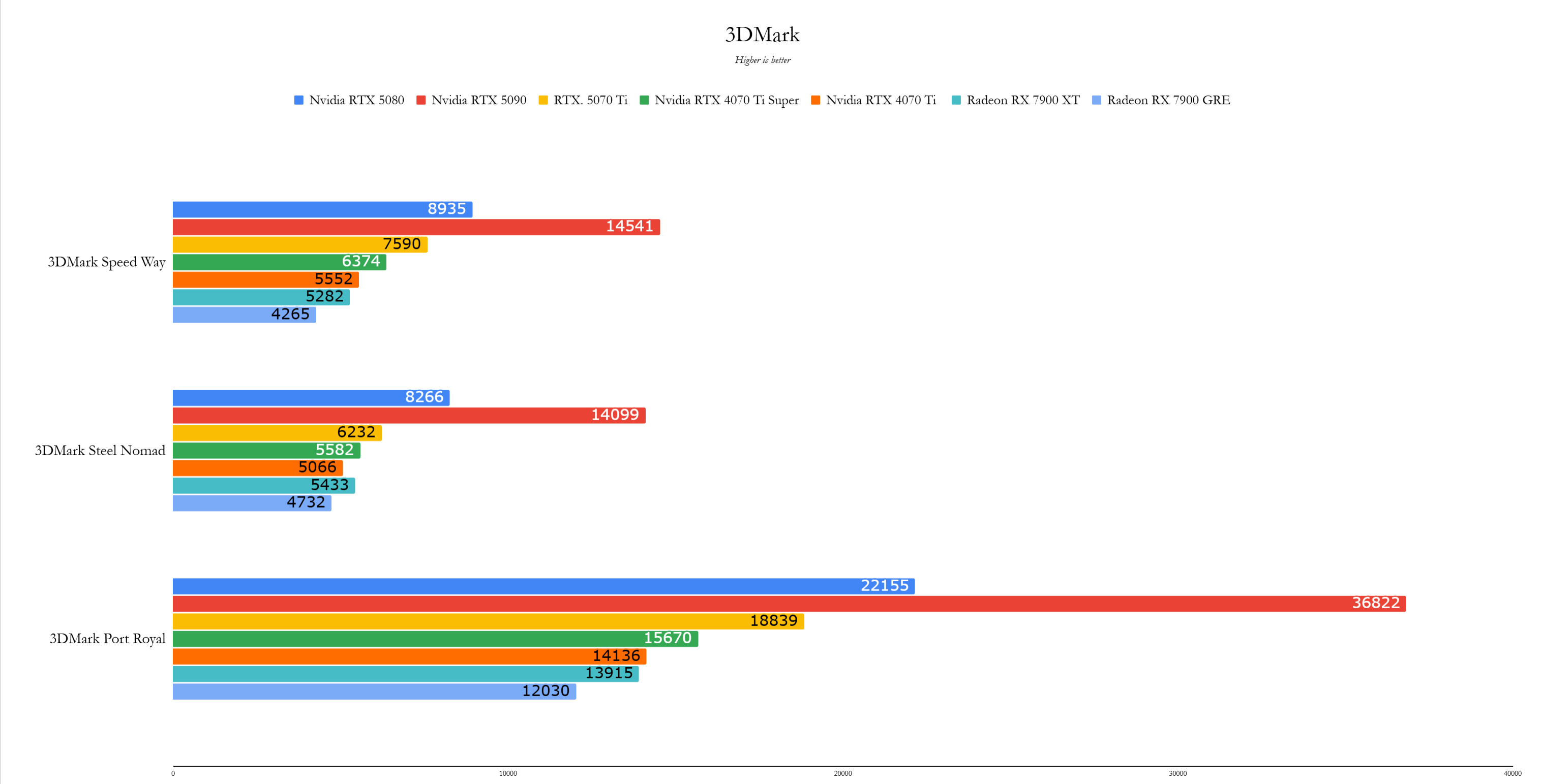
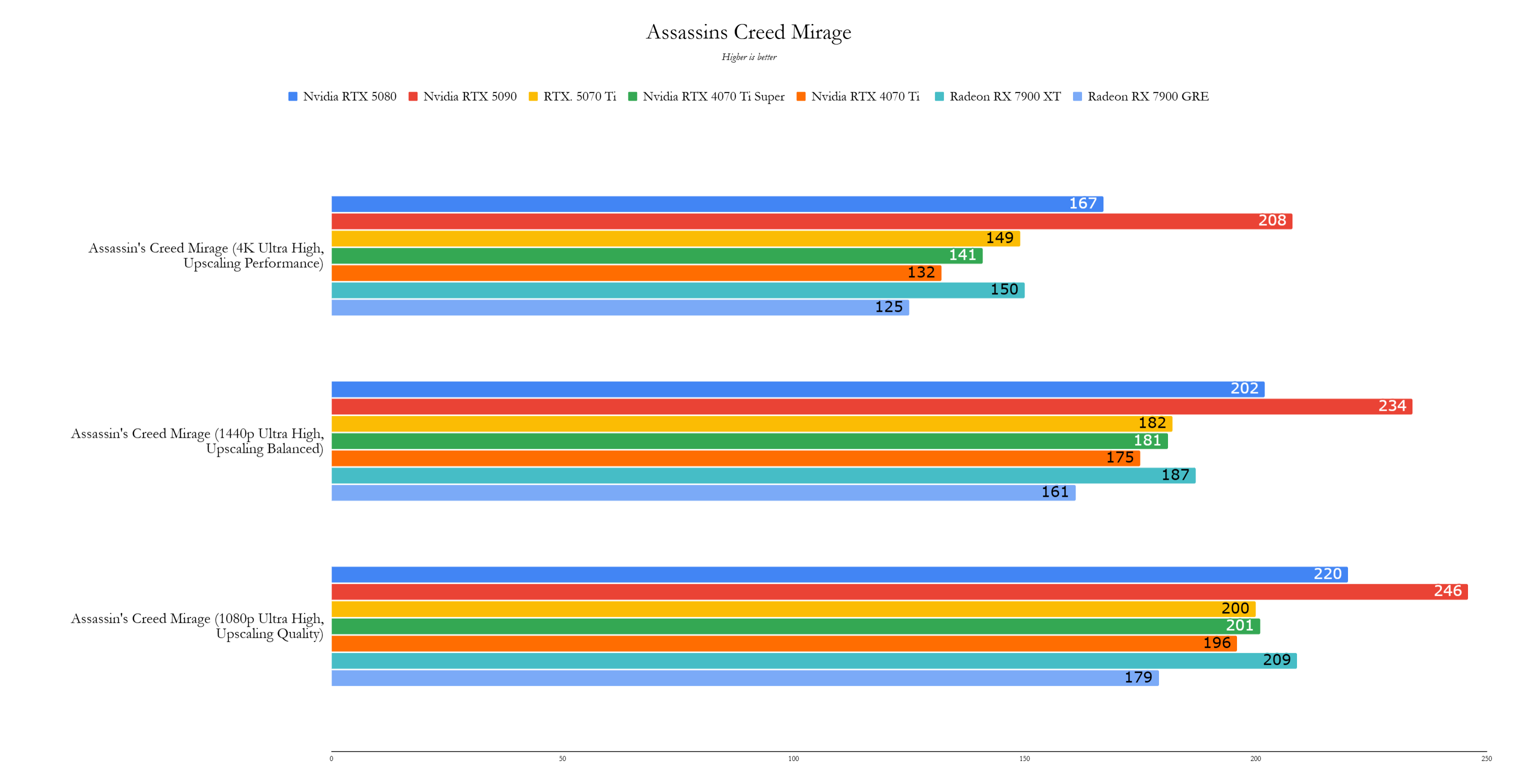 12 Images
12 Images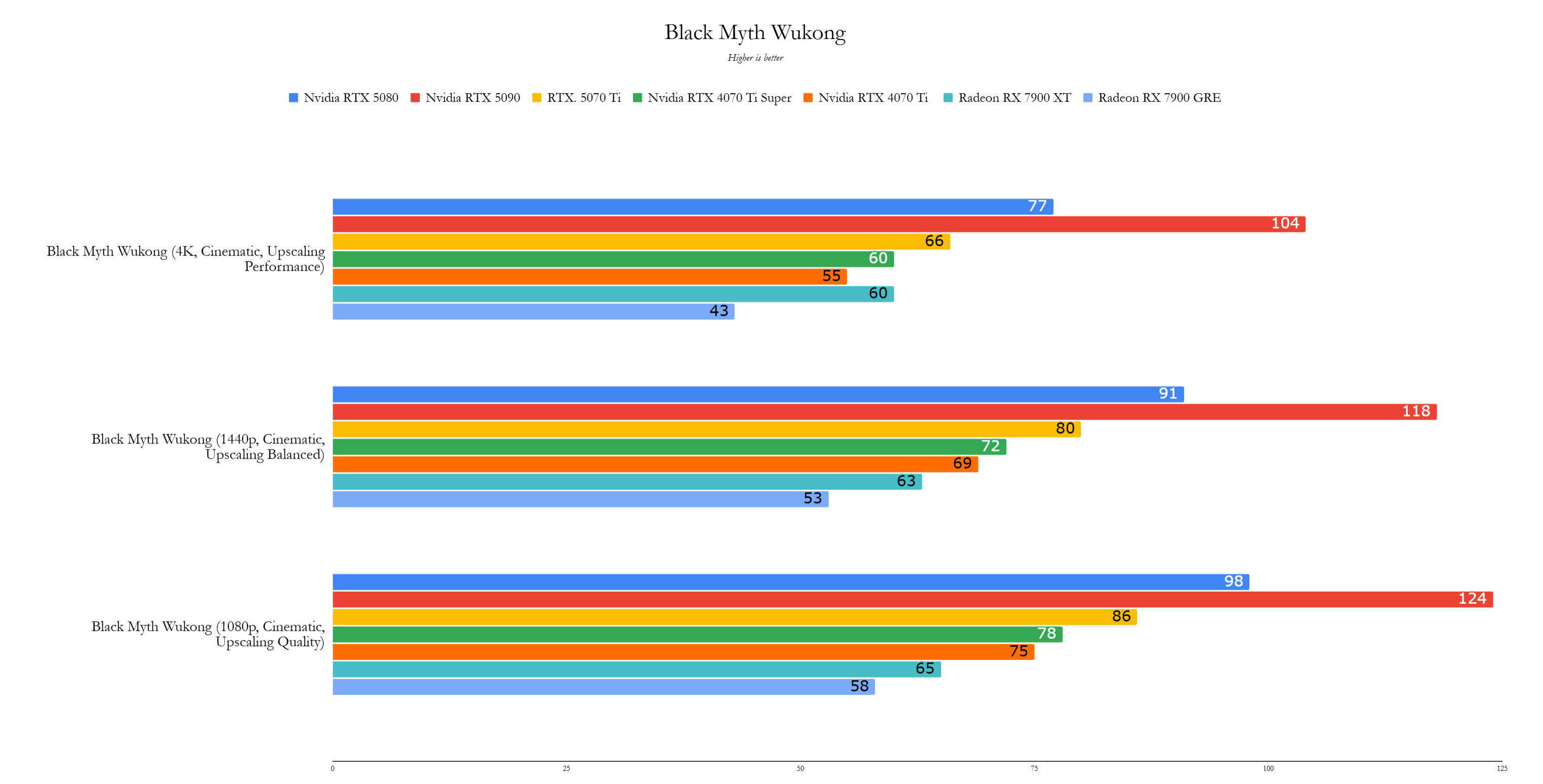
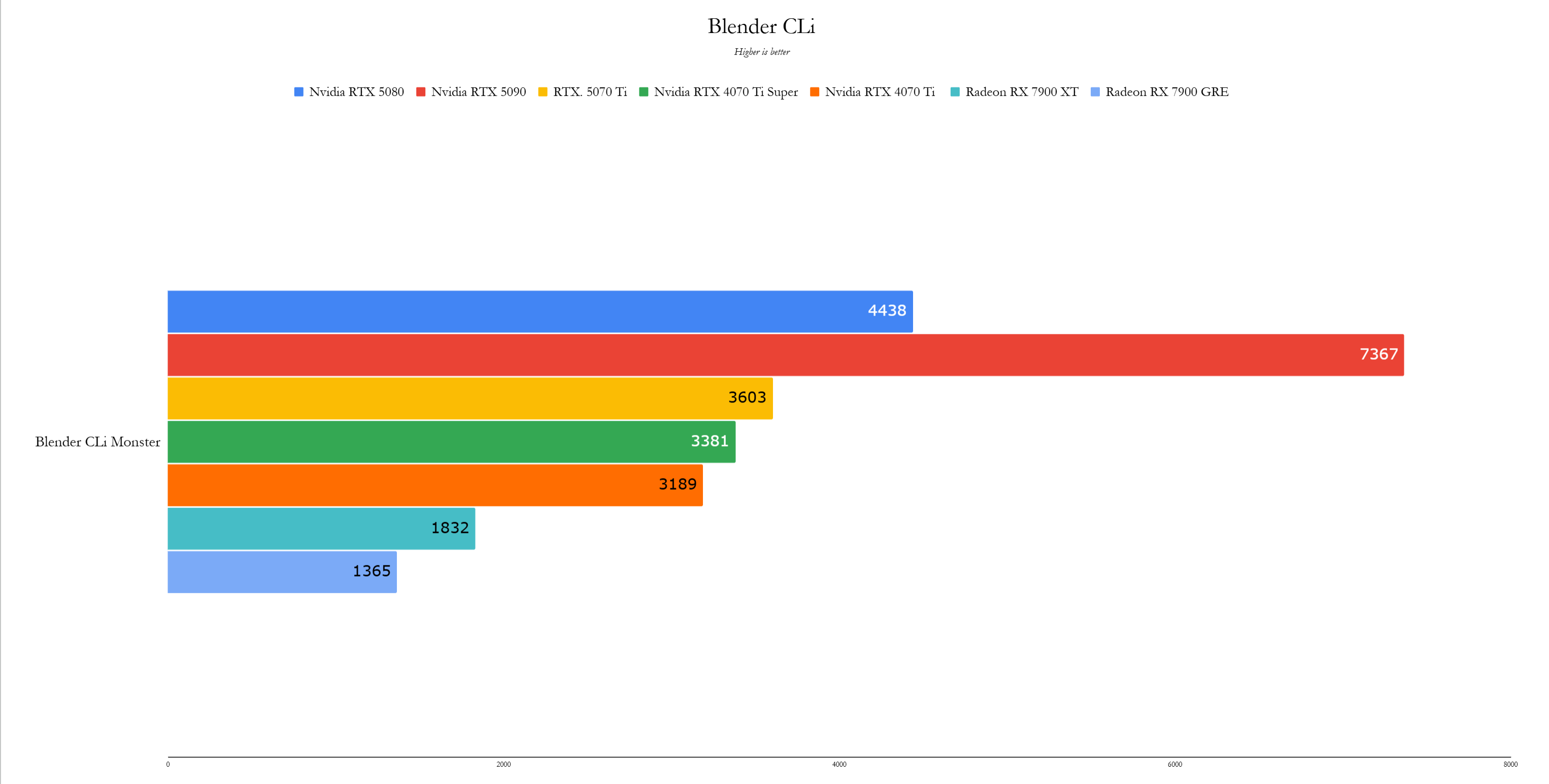
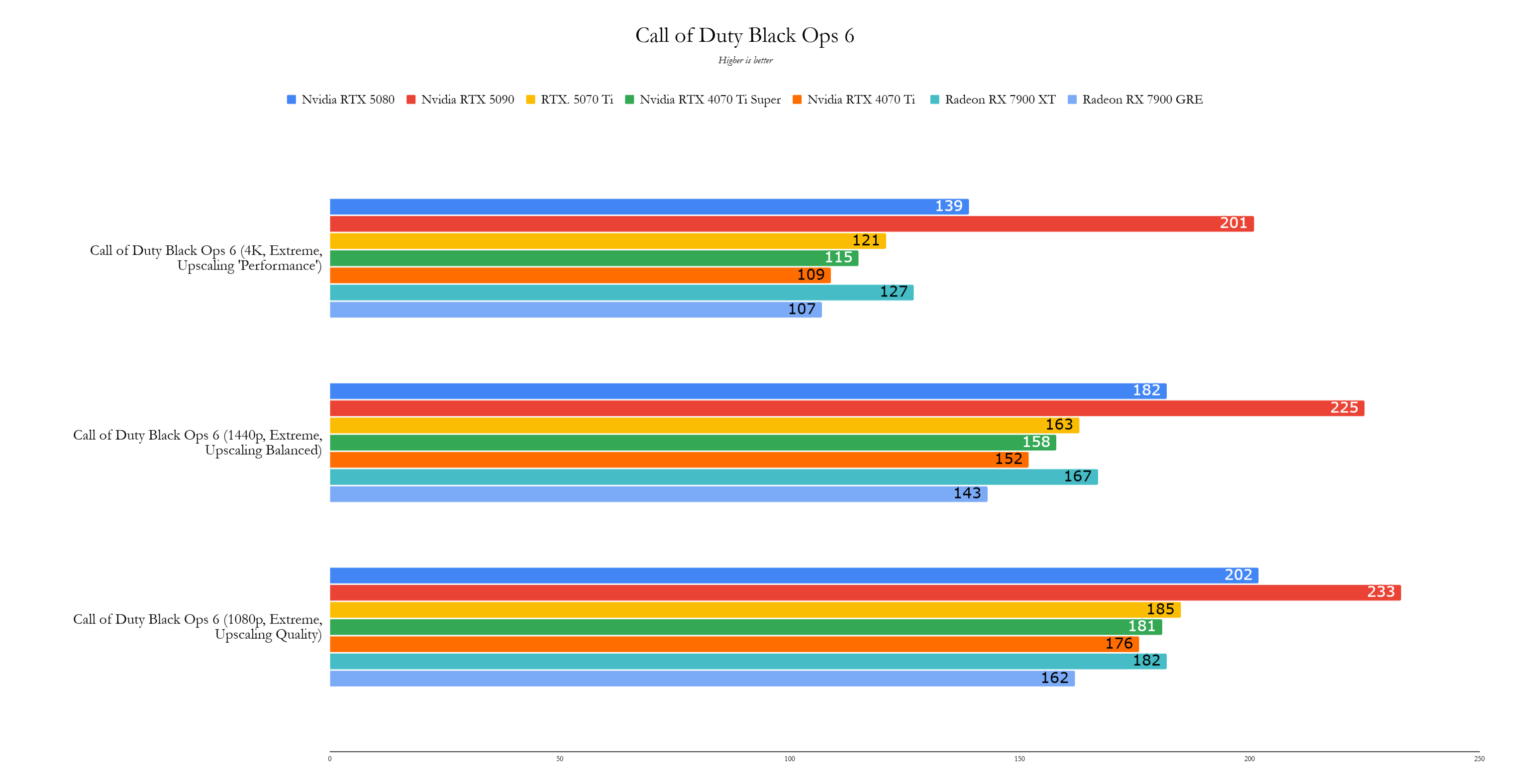
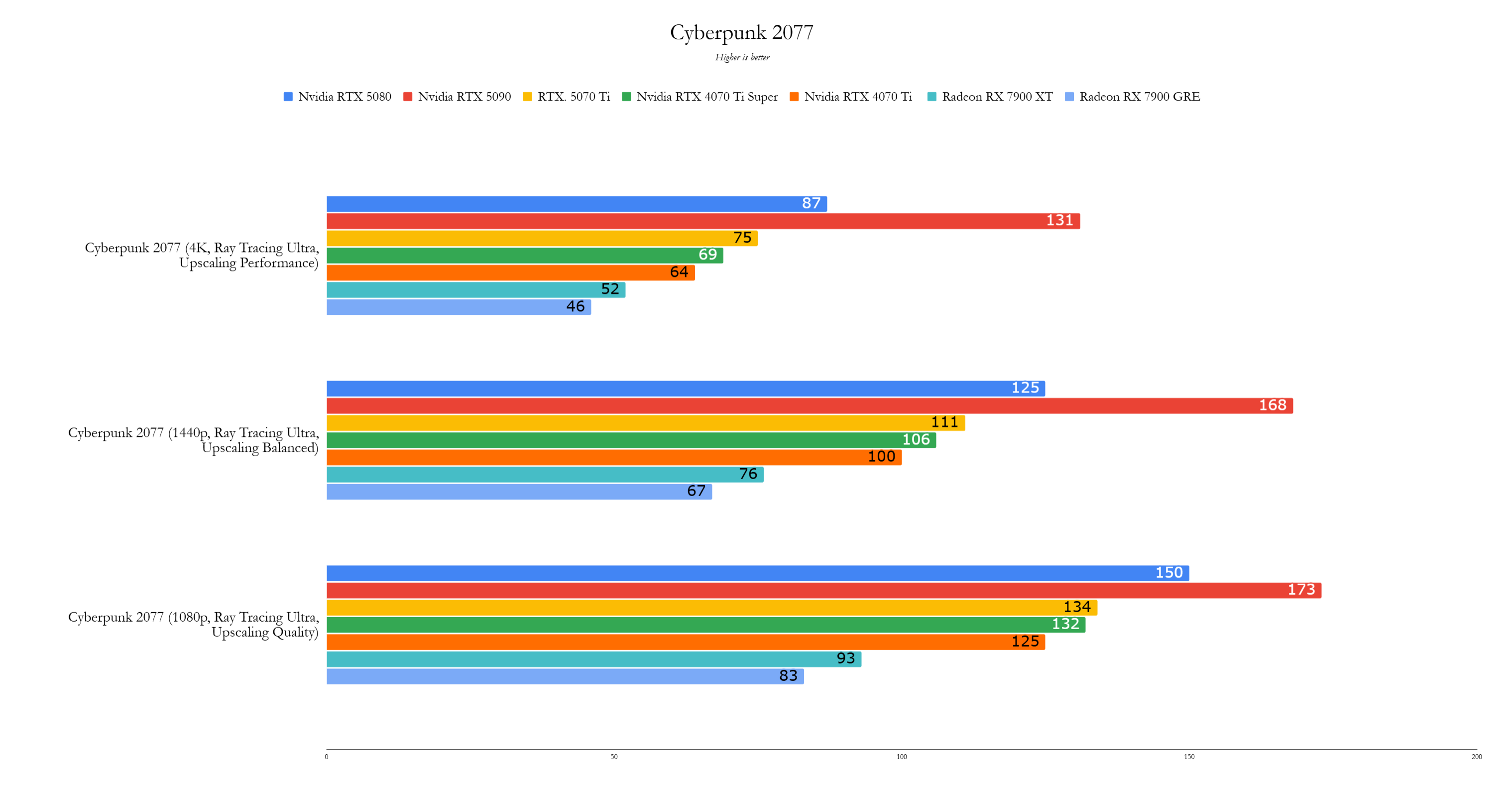
Performance
At 4K, the Nvidia GeForce RTX 5070 Ti outperforms the RTX 4070 Ti Super by 11% and the RTX 4070 Ti by 21%, showcasing a significant generational improvement. This makes the RTX 5070 Ti an excellent value among the current generation of GPUs. In my tests, it consistently surpassed 60 fps at 4K, even in demanding titles like Black Myth Wukong and Cyberpunk 2077.
The test system used included an AMD Ryzen 7 9800X3D CPU, Asus ROG Crosshair X870E Hero motherboard, 32GB G.Skill Trident Z5 Neo RAM at 6,000MHz, a 4TB Samsung 990 Pro SSD, and an Asus ROG Ryujin III 360 CPU cooler. The RTX 5070 Ti was tested at stock settings to reflect its performance at the $749 MSRP, using the latest drivers and game versions without frame generation, and with appropriate upscaling technologies.
In 3DMark Speed Way, the RTX 5070 Ti scored 7,590 points, a 19% improvement over the RTX 4070 Ti Super and a 36% jump over the RTX 4070 Ti. In Port Royal, it achieved 18,839 points, demonstrating its potential for future growth as drivers and games optimize for the Blackwell architecture.
In actual gameplay, the RTX 5070 Ti delivered 121 fps in Call of Duty: Black Ops 6 at 4K Extreme, a modest 5% improvement over the RTX 4070 Ti Super. In Cyberpunk 2077, it achieved a 9% lead over the RTX 4070 Ti Super and 17% over the RTX 4070 Ti, maintaining a steady 75 fps at 4K with Ray Tracing Ultra. Metro Exodus: Enhanced Edition saw the RTX 5070 Ti at 48 fps at 4K on the Extreme preset, outperforming the RTX 4070 Ti Super by 3 fps.
Red Dead Redemption 2 was an exception, with the RTX 5070 Ti slightly underperforming the RTX 4070 Ti Super by 2%. However, in Total War: Warhammer 3, it achieved 78 fps at 4K max settings, a 15% improvement over the RTX 4070 Ti Super and 30% over the RTX 4070 Ti. In Assassin’s Creed Mirage, it managed 149 fps at 4K Ultra High, and in Black Myth Wukong, it maintained 66 fps at 4K with the Cinematic Preset and DLSS at 40%, outperforming both the RTX 4070 Ti Super and the Radeon RX 7900 XT.
Forza Horizon 5 saw the RTX 5070 Ti reach 152 fps at 4K with the Extreme preset, a 15% improvement over the RTX 4070 Super and 21% over the RTX 4070 Ti, and a 10% lead over the Radeon RX 7900 XT.
In conclusion, even mid-range graphics cards are now capable of handling 4K gaming. If you can find the Nvidia GeForce RTX 5070 Ti at its starting price of $749, it offers unparalleled value, particularly for 4K gaming enthusiasts. Not only does it provide a significant uplift over its predecessor, but it does so at a more accessible price point than the RTX 4070 Ti.








